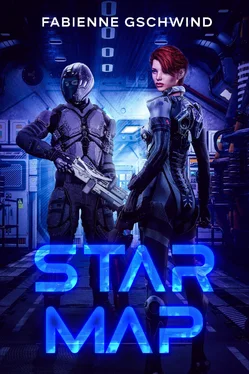Back from his first ten-year mission, he brought back 1000 pages of groundbreaking subspace observations and also a new theory for calculating discontinuity in multidimensional form. He became a pop star among subspace physicists and toured the united planets with his family giving lectures and publishing his findings. Here he also discovered that he liked to share his knowledge. But unfortunately, his lectures were completely chaotic and far from organized. He wrote formulas on the old-fashioned chalkboard and often began to stutter so that no one understood him. Thus, his lectures were usually poorly attended, and the scientific community focused mainly on his written work. Milo could have easily imagined himself teaching and doing research at a university. But no one wanted to offer a chair to this disorganized genius. This made Milo very sad, and living with many people made him irritable and he could hardly concentrate. So, he asked StarMap if he could participate in a mission again. StarMap, of course, was very enthusiastic, because in two years the great Abhysal mission would begin. To keep him happy until then, he was given an office and a small apartment at StarMap headquarters and allowed to work through all the raw subspace data collected by the mapping ships.
Milo missed being in subspace himself and couldn't wait for the Abhysal mission to begin.
Lexaly was a special case; no one knew exactly why she had joined StarMap. In any case, she didn't seem to be adventurous, and a tragic disaster like Jay's could not be accounted for. She claimed only to want to make money and to love subspace. She was a computer scientist and had discovered AI programming while in college. AI programming was the most difficult thing there was, and programming only small parts required thousands of man-hours. That's why the data interface was developed. It was implanted in the brainstem, and programmers could work directly in the AI. To do this, one had to be very conscientious, perfectionist, and able to concentrate for hours. Of course, you had to be able to program excellently in advance, otherwise, you had no chance with the complicated AI programming language. Lex met all the requirements. She was always introspective, very precise in all her work, also very calm and focused. Most people thought she was shy and timid. But in reality, she just liked to work alone and found computer programs more interesting than other people. But in the third year of her training as an AI programmer, disaster strikes.
She was at the AI headquarters in Marrakesh and connected with her implant to the AI chair as usual. Conscientiously, she studied the changes she was seeing in the hospital AI at a hospital in Delhi. The new fully automated premature infant unit would open soon, and she needed to make some final adjustments. Routine work. In fact, it wasn't her project, but that of Betty, her supervisor, who was on sick leave. But the work was so simple that the programming company decided to have an apprentice do it. The window of opportunity opened and Lex contacted the foreign AI. She worked diligently for two hours, with only one correction giving her trouble. Was she programming correctly? Should she call the supervisor? She was at odds with herself. The window would close soon, and if she delayed and the AI wasn't ready in time, the company would have to pay fines. It would also negatively affect her evaluation if she couldn't do such a simple routine job on her own. Failure was the worst thing Lex could imagine. So, she decided to take a few more minutes and retrace the steps. When she looked at the code again, it looked perfectly fine, and Lex calmed down. She finished the programming and conscientiously wrote her log before finishing her shift.
The horror followed three months later. A newspaper article said 17 infants had died in the newly opened premature infant unit. The fault was a misprogrammed infusion pump. Lex still had all the program codes in her head. She had made the mistake, now she knew: She had made a comma error and the infusion pump had dosed incorrectly. In a panic, Lex waited the next few days for the police to arrest her. But nothing happened. When she reread the newspaper, it turned out that the manufacturer of the infusion pumps had been charged because a pump had actually made a mistake.
Lex was paralyzed; someone would find out. Someone would see that the AI programming was wrong! By the time of next month's brain scan at the latest, everyone would know that she was responsible for a terrible accident!
But an accident rarely came alone; her twin sister died in an accident just two days later. Lex fell into a deep depression, not only the death of her sister but especially the death of the newborns weighed on her, 17 innocent children had died because of her fault. The brain scan showed Lex's deep disruption, and everyone believed it was the death of her beloved sister.
The AI company offered her time off to grieve. As if in a trance, Lex booked a grief workshop. It wasn't until she stayed overnight in an old convent that she realized she had booked time off with nuns.
But the months there did her good. Religion had been completely forgotten in the modern world, and it was the first time Lex had heard of a God. But she soon found comfort in faith, and one morning while praying in the old church, she realized what she had to do. She had to atone for her guilt! Her confessor listened to her concerns without judgment and helped Lex find a solution. Lex knew exactly what she had to do, she would spend her life as a kind of emeritus. She was going to do something good for humanity. She would join StarMap and use her skills to contribute to the successful completion of missions. In seclusion on the spaceship, she would have all the time in the world to pray for the lost souls.
She never told anyone about her plans. It was clear to her that her plan would sound completely crazy to an outsider.
With fresh courage, she completed her training and hired on at StarMap. She almost expected the police to be waiting for her when she returned from her first ten-year mission. But no one noticed the AI error, and in the meantime, the hospital AI had been replaced. So, there was no longer any evidence of Lex's "crime." But Lex judged that God had cleared up some of her guilt and wanted to save her from the shame of an arrest. She felt vindicated in her actions and immediately signed on again for the Abhysal mission.
After her first mission, no one from her family understood why she wanted to fly away again. But you could see how happy and content she was, and her family let her go again.
Joe was a classic adventurer, as were most of the people who joined StarMap. In her youth, she had participated in both sailing races and subspace rallies, and could never get enough of the adrenaline rush. But her hobbies were expensive, as a subspace racing ship costs several years' salary, so she signed on as a machinist on subspace cruisers early on. But her earnings weren't that high, and vacation days were never enough for her planned adventures. So, she decided to work for StarMap for ten years. That would earn her enough money to sail or do subspace rallies for the rest of her life.
Her first StarMap mission failed completely. Two monster waves rolled over the ship, and they were stuck on a reef for two years after that. Joe was the only one who had experience as a pilot in uncharted subspace. So, she was sent off in the small shuttle because everyone had lost hope that the rescue ships would find them. It took her six months to fight her way through subspace to the nearest road. But finally, they were all rescued.
After such an adventure, all the subspace rallies and sailing trips seemed boring, and Joe simply decided to go on another mission. After all, discovering subspace was probably one of the last adventures one could have as a human.
Читать дальше












